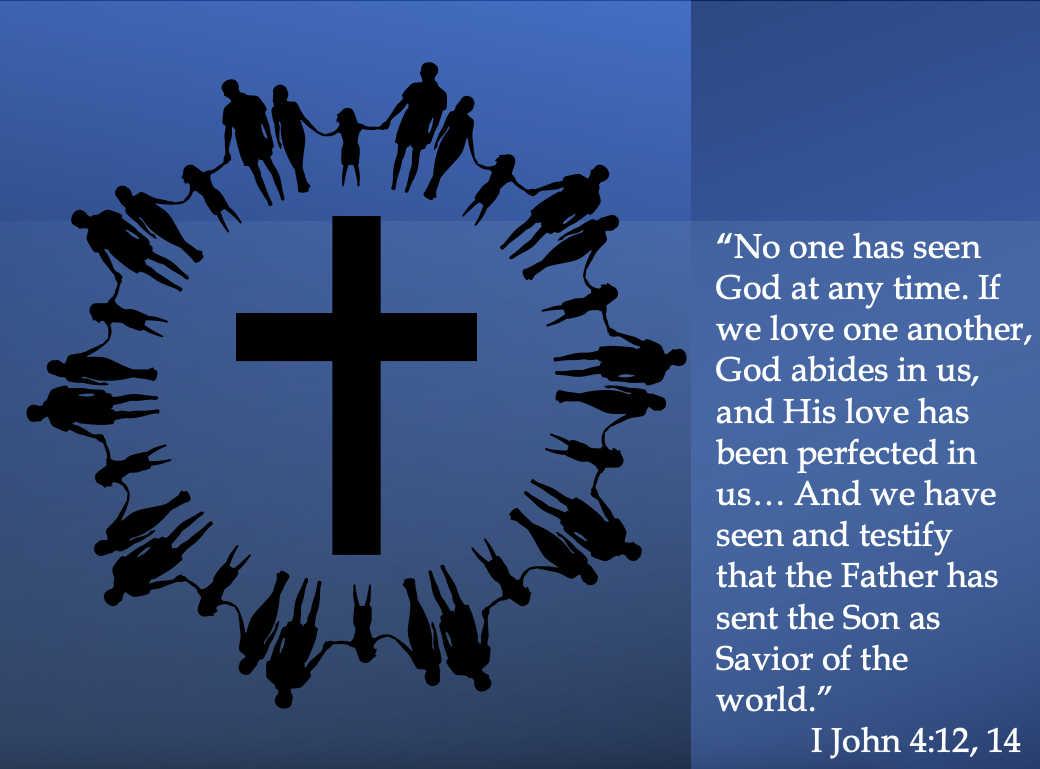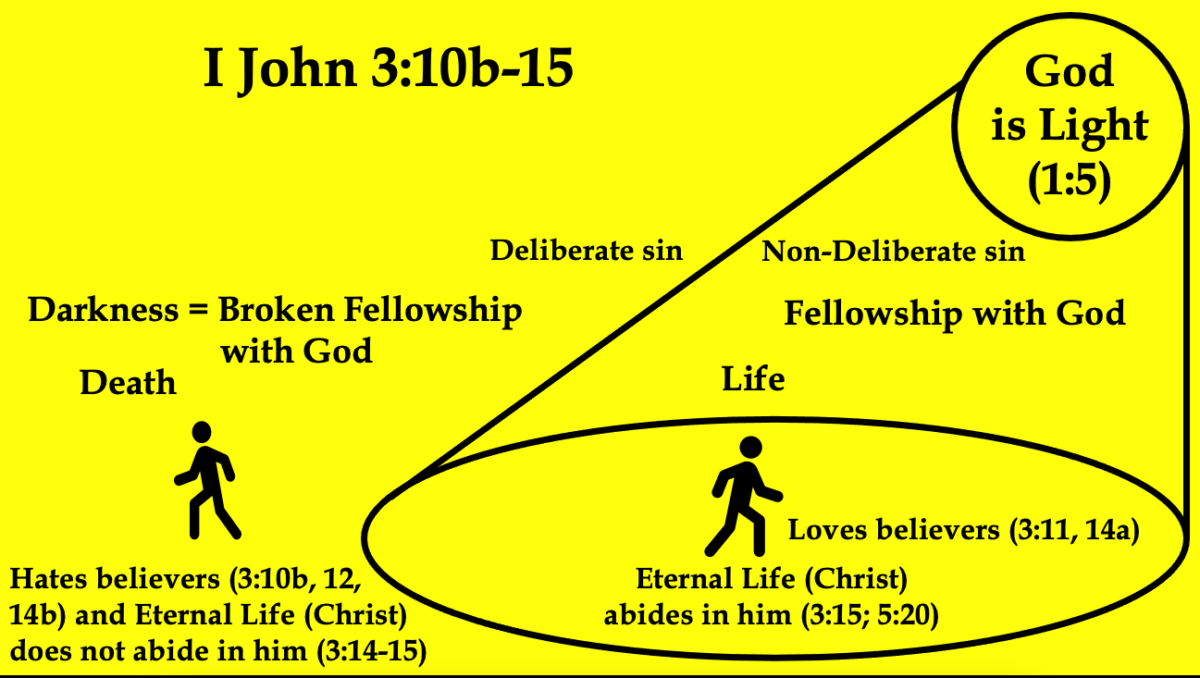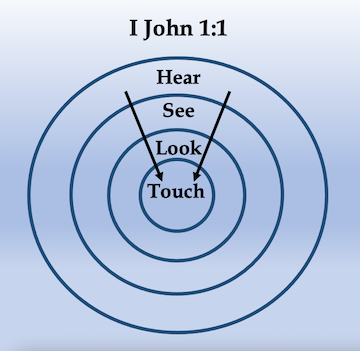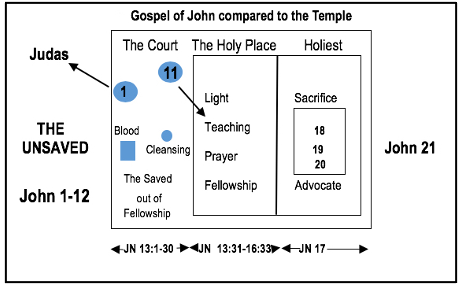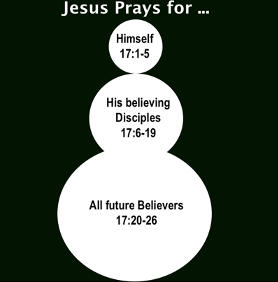“No one has seen God at any time. If we love one another, God abides in us, and His love has been perfected in us.” I John 4:12
When people go through severe trials, they may ask themselves, “How can a God of love permit me to go through such a horrible experience? I feel abandoned by God, not loved by Him.” Even Christians who have spent their lives loving and serving the Lord have felt this way when they are blindsided by a debilitating disease, a financial collapse, children who have rebelled against God and have no contact with them… you name it. 1
Several years ago, my wife and I felt called by God to start a new church on the south side of Des Moines, Iowa. We resigned from our current church outside of Des Moines to live in an apartment with our three daughters in a nearby town for fifteen months while we received training from the mother church of the church start. Near the end of the training, we bought a new home on the south side of Des Moines with the intent of living there the remainder of our lives if God permitted. At our grand opening in an elementary school, we had over 160 people attend, and several people professed faith in Christ. We were off and running! It was a dream come true.
Fast forward three years. The church had shrunk to about thirty people. We announced to our church family that we were going to resign from the ministry. My wife and I were burned out emotionally and spiritually. For the past year I had been crying out to God for additional Christian leaders to help us in the work of the ministry. When nothing happened, I felt abandoned by God. “Lord,“ I cried out to Him, “We left everything to serve You, and now we are having to step away from the ministry. Where are You in all of this? Don’t You love us anymore?” I knew intellectually that God loved us, but I didn’t feel it. I didn’t experience it.
I share this with you because the apostle John is going to share some important truths that relate to that situation and any situation for that matter where Christians are prone to doubt God’s love for them. John emphasizes seeing God’s love through our relationships with His people (4:12-16). You may recall that in 4:7-11 John exhorted his readers to love one another the way Christ had sacrificially and selflessly loved them. Now he is going to talk about perfecting that love in our relationships with one another.
John writes, “No one has seen God at any time. If we love one another, God abides in us, and His love has been perfected in us.” (I John 4:12). You may wonder, “How can John say no one has seen God when the Bible speaks of people seeing God?”(e.g., Exod. 33:21-23; Isaiah 6:1-5; Rev. 1:10-18). Those encounters with God did not reveal the fullness of His glory or His unveiled divine essence. If people saw God’s unveiled glory or divine essence, they would not live (cf. Exod. 33:20).
This invisible God, Whom no one has seen, “abides” (menei) in believers who “love one another” (4:12b). 2 Loving one another is a condition for fellowship or closeness with God, not salvation. Jesus never said, “Whoever loves one another should not perish but have everlasting life.” He said, “Whoever believes in Him should not perish but have everlasting life.” (John 3:16b). Belief in Christ alone results in eternal life. Loving one another results in God abiding in fellowship with Christians and being Christ’s disciple (cf. John 13:34-35). The Lord is at home in the believer who shares God’s love with other brothers and sisters in Christ.
Furthermore, when we “love one another,” God’s “love has been perfected in us” (4:12c). The Greek words translated “has been perfected” (teteleiōmenē estin) “are in a form (perfect tense) that suggests His love resulting in Christian love. God’s love achieves its goal and reaches its full measure in believers when that love is reproduced in them and reflected through them by loving one another.” 3
God’s (agapē) love is produced by God the Holy Spirit (Rom. 5:5). It is not something we can create on our own. It is a fruit of God’s Spirit (Gal. 5:21). The moment a person believes in Christ for His gift of eternal life, He receives the Holy Spirit (John 7:37-39; Gal. 3:2; Ephes. 1:13-14) and can begin to enjoy and share this agapē love.
John reminds us, however, that God’s agapē love is not static. It can be “perfected” or reach completeness 4 in a believer which suggests a deeper and fuller experience of that love (4:12; cf. 4:17). 5 God’s love can mature or grow up. For this to happen, we must be in community with other Christians. 6
“We might parallel this to what James tells us about sin in James 1:14-15. He says sin begins as a temptation in the mind. Then when our own lust of our heart merges with the temptation in our mind, Sin is conceived in the womb of our soul. After a gestation period, baby Sin is born into the world of our actions. With exercise and food, baby Sin grows up. When Sin becomes a full-grown adult (mature), she produces death. The point is that for Sin to mature, it must be born into the world of action. With repetition it grows up to maturity.
“Divine love is the same way. It may begin with a good intention in the womb of our spirit, but at this point it is only an embryo of love. For this love to be fully developed, it must be born into the world of our deeds, our actions. Properly nurtured and exercised, love becomes a full-grown, mature, and attractive young woman. And the world takes a look.
“So, this kind of love needs external expression to become mature. That’s why Jesus said He gives His disciples a new commandment to ‘love one another as I have loved you.’ That commandment is like a golden parrot hopping from branch to branch in this book, repeating itself over and over. Jesus says when we learn to love each other this way, then the whole world will know that we are His disciples (His fully-devoted followers). This is mature, perfect love.” 7
Even though a devastating trial can overwhelm a Christian and cause them to doubt God’s love for them, it is in the context of a community of believers who sacrificially and selflessly love one another that their confidence in God’s love for them can be restored (4:13-16). John writes, “By this we know that we abide in Him, and He in us, because He has given us of His Spirit.” (I John 4:13). The words “By this” refer to the previous verse and means we can “know that we abide in Him, and He in us” when we love one another in Christian community. That is, we can know we are having close, intimate fellowship with God when we are loving one another.
When John states “because He has given us of His Spirit” (4:13b), this reminds us of his words in 3:24, “And by this we know that He abides in us, by the Spirit whom He has given us.” The Greek construction translated “of His Spirit” (ek tou Pneumatos) in 4:13 is the same for the words translated “by the Spirit” (ek tou Pneumatos) in 3:24. This “suggests participation in the Spirit of God, literally, ‘He has given us out of His Spirit…’ When a believer loves, he is drawing that love from God’s Spirit (cf. Rom. 5:5), Who is also the Source of his confession of Christ (1 John 4:2). Thus, both the faith and the love enjoined in the dual ‘command’ of 3:23 are products of the Spirit’s operation in a believer. A believer’s Spirit-led obedience becomes the evidence that he is enjoying the mutual abiding relationship with God that John wrote about.” 8
John has just told us “if we love one another,” then the God Whom “no one has seen… abides in us, and His love has been perfected in us” through “His Spirit” (4:12-13). As a result of this experience, John writes, “And we have seen and testify that the Father has sent the Son as Savior of the world.” (I John 4:14). This is considered by some to be the most important verse in all of I John to understand. 9
The “we” in 4:14 does not refer only to the apostles as it did earlier in the epistle (1:1-5; 2:19; 3:14; 4:6). In all those places there was a contrasting “you” (1:2-4; 2:20; 3:13; 4:4; et al.). But in 4:7-14, there is no contrasting “you,” so the first-person plural (“we” or “us”) includes the apostles and the readers. 10
This is significant because in the first verses of the epistle, John said that he and the other apostles (“we”) have “seen” (heōrakamen), “looked upon” (etheasametha), and “handled” the “Word of Life” physically (1:1). They have “seen” (heōrakamen) and “bear witness” (martyroumen) to his readers about that “eternal life,” Jesus Christ (5:20), Who “was with the Father and was manifested to” them physically (1:2). John wrote of what they have “seen” (heōrakamen) so his readers “also may have fellowship with” the apostles and “with the Father and with His Son Jesus Christ” (1:3).
While John’s readers could not see and touch the physical Jesus as the apostles had, when they love one another, John could say have they “seen” (tetheametha)and “testify” (martyroumen) “that the Father has sent the Son as Savior of the world” (4:14). When we observe sacrificial and selfless love in the community of Christians, John seems to be saying that we can see the Father’s love which was a perfect love, a love that sent His only begotten Son into the world to save the world through His own sacrificial and selfless love on the cross. 11
“The Church has no more effective way to testify to the world about the Saviorhood of Jesus than by the re-display of the Savior’s love in the fellowship of His disciples.” 12
Let’s summarize what John is saying: Although no one “has seen” (tetheatai) God (4:12), Christians who “abide” in Him (4:13) “have seen” (tetheametha)the Son spiritually as His life is manifested among loving Christians.Believers who observe this manifestation have in fact “seen” and can “testify” to the Saviorhood of Jesus (4:14). 13
By loving one another, John’s readers could enjoy fellowship with the apostles in what the apostles “have seen” (heōrakamen) which is exactly why John wrote his epistle (1:1-3a). This is equivalent to having fellowship “with the Father and with His Son Jesus Christ” (1:3b). 14
But John also desired that his readers not only have fellowship with him and the other apostles in what the apostles had “seen,” but also in what they had “heard” (akēkoamen) about Jesus Christ (1:1-3a). 15 John writes, “Whoever confesses that Jesus is the Son of God, God abides in him, and he in God.” (I John 4:15). Once again John uses the word “confesses” (homologēsē) which means to “to speak the same,” “to agree, confess, acknowledge… in public.” 16 Confessing “that Jesus is the Son of God,” is also another condition for fellowship or intimacy with God (“God abides in him, and he in God”). When Jesus is confessed as “the Son of God,” He is also confessed as “Christ come in the flesh” (4:2) and as the One Who guarantees a future resurrection and never-ending life to all who believe in Him (cf. John 11:25-27). 17
The wording of 4:14 (“we have seen and testify”) reflects the words of John the Baptist when he said of Jesus, “I have seen and testified that this is the Son of God” (John 1:34). So, in the context of the Christian community, John is speaking of the visible manifestation of Christian love accompanied by the verbal confession of Jesus as the Son of God (4:12-15). Both these fundamental expressions among God’s people reproduce what the apostles themselves had “seen” in Jesus and what they had “heard” about Him from His forerunner, John the Baptist (cf. John 1:32-34). 18
Regarding John the Baptist’s testimony in John 1:32-34, Yarbrough states: “God’s Spirit descended and ‘remained’ on Jesus, according to John the Baptist (1:32, 33). The Spirit was Jesus’s constant companion. To ‘remain’ or ‘abide’ in Jesus’s teaching is to be His true disciple (8:31). A disciple will be informed and steered by all that Jesus commanded and taught. God the Father ‘remained’ or ‘abode’ with Jesus during His earthly days (14:10). The Father was the source of the very words He spoke, and Jesus ‘remained’ continually in the Father’s love (15:10b. ‘Abiding’ describes a reality involving Father, Son, and Spirit.” 19
When believers live in an atmosphere of mutual Christian love (4:12-15), they can say along with the apostle John, “And we have known and believed the love that God has for us. God is love, and he who abides in love abides in God, and God in him.” (I John 4:16). The Greek words translated “have known” (egnōkamen) and “believed” (pepisteukamen) are in the perfect tense. Since these are stative verbs in the perfect tense, they refer to a state of intimate knowledge and total trust that God loves us (see comments on 2:3). 20 Since “God is love,” the Christian “who abides in love abides in God, and God in him.”
When Christians face painful circumstances, it can be easy for us to doubt God’s love for us. The apostle John says the best way to restore our confidence in God’s love for us is to see and hear His love expressed in a Christian community.
Let me return to my opening testimony. After the closure of the new church in south Des Moines, I was devastated. I doubted that God truly loved me. I felt like a total failure and that God would never use me again to advance His gospel. I had given up on God’s love for me and I assumed He had given up on me as well.
A few months after the church closed, God led my family and I to a church where we encountered His amazing love. The people welcomed us with open arms and came alongside us to help us see ourselves as God’s beloved children. The pastor there had been through a similar church planting experience, and he understood how we felt. He knew how to minister God’s love to us in practical ways that were meaningful to us. Instead of exhorting us with Scriptures, he listened to us and spent time with us. We also got plugged into a small group of believers who loved on us and accepted us as we were.
As we saw and heard the amazing love of Jesus Christ in this Christian community, gradually our confidence in God’s love for us was not only restored, but it was deepened and intensified. We were able to experience the kind of intimate fellowship with God that the apostles experienced.
I don’t know what you are facing right now, but I would guess that some of you are where I was at a few years ago. Perhaps you doubt God’s love for you because you or someone close to you has a debilitating disease or the loss of a job. Maybe after serving God sacrificially and selflessly for years, you were deeply hurt by an unloving Christian. As a result, God’s love seems very distant and invisible to you.
Whatever pain you are carrying, please know that God wants to reveal His love to you through His people. Just as we cannot see the wind, we can see its effects. We cannot see God, but we can see His love operating through Christians when they love one another. 21 His children are not perfect. But if they are enjoying intimate fellowship with the God of love, they will be able to share that love with you. And if you will let them do that, your knowledge and faith in God’s love for you will be restored and deepened.
Prayer: Heavenly Father, thank You for making Your sacrificial and selfless love visible to us through Your only begotten Son Whom You sent to die on a cross for all our sins. Such love may be difficult for us to believe when we encounter severe trials and disappointments in life. We may doubt Your love for us when we experience suffering and pain. But You never intended for us to face that pain and suffering alone. Thank You for providing an atmosphere of mutual Christian love in churches that abide in You and Your Holy Spirit. Use us to be a channel of Your love to those who doubt Your love for them. May each of our churches reflect the love of the Savior as we love one another. In the mighty name of the Lord Jesus Christ, we pray. Amen.
ENDNOTES:
1. Adapted from David R. Anderson, Maximum Joy: I John – Relationship or Fellowship? (Grace Theology Press, 2013 Kindle Edition), pg. 212.
2. The phrase, “If we love one another” (ean agapōmen allēlous) is a third-class condition and refers to a general truth at the present time. See Archibald Thomas Robertson, A. T. Robertson’s Word Pictures in the New Testament [with Bible and Strong’s Numbers Added!], 6 Volumes (E4 Group, 2014 Kindle Edition), Kindle Location 207051.
3. Zane C. Hodges; Robert Wilkin; J. Bond; Gary Derickson; Brad Doskocil; Dwight Hunt; Shawn Leach; The Grace New Testament Commentary: Revised Edition (Grace Evangelical Society, Kindle Edition, 2019), pg. 600.
4. Walter Bauer, A Greek-English Lexicon of the New Testament and Other Early Christian Literature: Third Edition (BDAG) revised and edited by Frederick William Danker (Chicago: University of Chicago Press, 2000 Kindle Edition), pg. 996.
5. Zane C. Hodges, The Bible Knowledge Commentary Epistles and Prophecy, Editors John F. Walvoord and Roy B. Zuck (David C. Cook, 2018 Kindle Edition), Kindle Location 3973.
6. Anderson, Maximum Joy, pg. 212.
7. Ibid.
8. Hodges, The Bible Knowledge Commentary Epistles and Prophecy, Kindle Location 3974 to 3979.
9. Tom Constable, Dr. Constable’s Notes on 1 John, 2022 Edition, pg. 99 cites Zane C. Hodges, The Epistles of John: Walking in the Light of God’s Love (Irving, Tex.: Grace Evangelical Society, 1999), pg. 192; Hodges, The Grace New Testament Commentary, pg. 600.
10. Hodges, The Grace New Testament Commentary, pg. 600.
11. Anderson, Maximum Joy, pg. 214.
12. Constable, Dr. Constable’s Notes on 1 John, pg. 99 cites Hodges, The Epistles of John, pg. 192.
13. Hodges, The Bible Knowledge Commentary Epistles and Prophecy, Kindle Location 3985 to 3990.
14. Hodges, The Grace New Testament Commentary, pg. 600.
15. Ibid.
16. Bauer, A Greek-English Lexicon of the New Testament, pg. 708.
17. Hodges, The Grace New Testament Commentary, pg. 600.
18. Ibid.
19. Constable, Dr. Constable’s Notes on 1 John, pg. 100 cites Robert W. Yarbrough, 1—3 John, Baker Exegetical Commentary on the New Testament series (Grand Rapids: Baker Academic, 2008), pg. 252.
20. Anderson, Maximum Joy, pg. 216.
21. Tony Evans, CSB Bibles by Holman, The Tony Evans Bible Commentary (B & H Publishing Group, Kindle Edition, 2019), pg. 2948.

